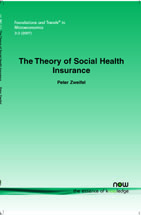The Theory of Social Health Insurance
By Peter Zweifel, University of Zürich, Socioeconomic Institute, Switzerland, pzweifel@soi.unizh.ch
Abstract
The objective of this text is to develop the theory of social health insurance (SHI; the expression used especially in the United States is "public health insurance," which will be viewed as one variant of SHI here). While a good deal is known about the demand and supply of private insurance, the theoretical basis of SHI is much more fragile. Specifically, on the demand side, what are the reasons for social (or public) health insurance to exist, even to dominate private health insurance in most developed countries? With regard to supply, what do we know about the objectives and constraints of SHI managers? Finally, economists can predict properties of the equilibrium characterizing private health insurance (PHI). However, what is the likely outcome ("performance") of SHI? At the normative level, one may ask, Should the balance be shifted from SHI to PHI?
The Theory of Social Health Insurance
The Theory of Social Health Insurance develops the theory of social health insurance also known as public health insurance. While a good deal is known about the demand and supply of private insurance, the theoretical basis of social health insurance is much more fragile. The Theory of Social Health Insurance examines questions including why does social health insurance exist and even dominate private health insurance in most developed countries? What are the objectives and constraints of social health insurance managers? What is the likely outcome or "performance" of social health insurance? The Theory of Social Health Insurance reviews the conventional theory of demand for insurance and health insurance, the supply of health insurance in general and social health insurance in particular, the properties of the optimal health insurance contract, and whether there are factors limiting the growth of social health insurance.
